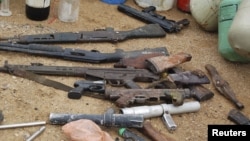ABUJA —
A man who claims to be a commander from the Islamist militant group known as Boko Haram declared a unilateral cease-fire Monday in Maiduguri in northern Nigeria. It is not clear if Sheik Abu Mohammed Ibn Abdulazeez is speaking for all of Boko Haram, but officials say they will consider terms laid out by the group.
This is the first time a person has physically appeared at a press conference claiming to be a Boko Haram leader. Usually they call from blocked lines, post You Tube videos or send e-mails when they want something made public. In a 10-minute speech, Abdulazeez says he is second in command to Abubakar Shekau, the man who is believed to lead the group.
Reading a statement in the local Hausa language, Abdulazeez urges all Boko Haram members to lay down their weapons and also to tell their friends so security forces can arrest anyone “carrying arms or killing under our names.”
Nobody knows how many factions there are of Boko Haram and which ones may take orders from Abdulazeez. By their actions, some Boko Haram members appear to want to enforce a harsh form of Islamic law while others are just at war with Nigerian security forces.
Abdulazeez says in return for the cease-fire, the Borno state government, in the heart of the insurgency, has agreed to release imprisoned Boko Haram members. If the government doesn’t fulfill what he describes as a “promise,” he says the security crisis will continue indefinitely.
Isa Gusau, the spokesperson for the Borno State governor neither confirmed nor denied that officials had met with Abdulazeez. But, he says, Governor Kashim Shettima has repeatedly called for peace talks with Boko Haram.
"I think he was the first person to speak to speak on the need for dialogue as the best way out of this problem because we are talking about guerrilla warfare. Even the most advanced countries do not deal with guerrilla warfare easily," Gasau said.
In a text message late Monday, Lieutenant Sagir Musa, a security force spokesperson, said they welcomed the cease-fire announcement but they will not relax operations, and described Abdulazeez as Boko Haram’s leader. Musa did not comment on the group’s demand to release members.
Boko Haram began violent operations in 2009, and it has killed an estimated 3,000 people in attacks on churches, schools government and newspaper offices, security forces, markets and the local United Nations headquarters.
Human rights groups have accused security forces of killing hundreds more in operations to subdue the militant group.
Late last year, an aide to President Goodluck Jonathan said the government would not negotiate with Boko Haram until the secretive organization supplied actual real people to hold peace talks. The aide said previous talks had failed because you “can’t discuss with the air.”
Abdulkareem Haruna contributed to this report from Maiduguri, Nigeria
This is the first time a person has physically appeared at a press conference claiming to be a Boko Haram leader. Usually they call from blocked lines, post You Tube videos or send e-mails when they want something made public. In a 10-minute speech, Abdulazeez says he is second in command to Abubakar Shekau, the man who is believed to lead the group.
Reading a statement in the local Hausa language, Abdulazeez urges all Boko Haram members to lay down their weapons and also to tell their friends so security forces can arrest anyone “carrying arms or killing under our names.”
Nobody knows how many factions there are of Boko Haram and which ones may take orders from Abdulazeez. By their actions, some Boko Haram members appear to want to enforce a harsh form of Islamic law while others are just at war with Nigerian security forces.
Abdulazeez says in return for the cease-fire, the Borno state government, in the heart of the insurgency, has agreed to release imprisoned Boko Haram members. If the government doesn’t fulfill what he describes as a “promise,” he says the security crisis will continue indefinitely.
Isa Gusau, the spokesperson for the Borno State governor neither confirmed nor denied that officials had met with Abdulazeez. But, he says, Governor Kashim Shettima has repeatedly called for peace talks with Boko Haram.
"I think he was the first person to speak to speak on the need for dialogue as the best way out of this problem because we are talking about guerrilla warfare. Even the most advanced countries do not deal with guerrilla warfare easily," Gasau said.
In a text message late Monday, Lieutenant Sagir Musa, a security force spokesperson, said they welcomed the cease-fire announcement but they will not relax operations, and described Abdulazeez as Boko Haram’s leader. Musa did not comment on the group’s demand to release members.
Boko Haram began violent operations in 2009, and it has killed an estimated 3,000 people in attacks on churches, schools government and newspaper offices, security forces, markets and the local United Nations headquarters.
Human rights groups have accused security forces of killing hundreds more in operations to subdue the militant group.
Late last year, an aide to President Goodluck Jonathan said the government would not negotiate with Boko Haram until the secretive organization supplied actual real people to hold peace talks. The aide said previous talks had failed because you “can’t discuss with the air.”
Abdulkareem Haruna contributed to this report from Maiduguri, Nigeria





